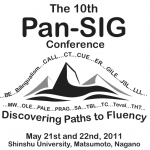conference curriculum EFL eikaiwa extensive listening JALT Language learning presentations readers Reading teaching technology testing
by sendaiben
leave a comment
My favourite conference in Japan
The call for papers for my favourite conference in Japan just came out -you can see more here.
The 2011 JALT Pan-SIG Conference will be held in May in Nagano. I really recommend it. Smaller, more relaxed, and friendlier than the national conference, the real selling point is the distilled value.
The Pan-SIG is made up of all the special interest groups in JALT, groups that specialize in things like computer assisted language learning, extensive reading, teacher training, pragmatics, teaching adult learners, and many others. These specialised groups then choose the presenters they want to represent them. In practice this means that the quality of presentations tends to be very high. I seldom feel I am wasting my time at the Pan-SIG.
I will hopefully be presenting on extensive reading (that idea that Eleanor told me to develop). I hope to see a lot of friends there too!
online resources presentations self-study teaching technology theory
by sendaiben
7 comments
TED online videos
Is there anyone out there who isn’t watching TED videos regularly?
Just in case, here are my three favourite ones:
1. Hans Rosling’s 2006 talk on poverty and statistics. Funny, compelling, jaw-dropping, illuminating.
2. Ken Robinson’s 2006 talk on creativity and education. Inspiring, funny, moving.
3. Ray Kurzweil’s 2005 talk on technological change. Amazing, unbelievable, futuristic, hopeful.
And an honourable mention: William Kamkwamba’s talk about building a windmill. Heart-warming, inspiring, wonderful.
What are your favourites? Please post them in the comments and give me more excuses to avoid my MA essay…
EFL eikaiwa online resources Reading rikai self-study SHS technology university
by sendaiben
1 comment
Popjisyo supports online reading for learners of English or Japanese
 I am a big fan of rikai and it’s various browser plugins (little programs you can download to add to the Firefox or Chrome browsers that give you rikai’s functionality), but the main page has personal ads on it, so I feel a bit hesitant about introducing it to students. Rikai allows you to copy and paste text or go to a website, and then provides mouseover (popup) vocabulary for words on the page. Basically, if you don’t know a word, you can move your mouse cursor over it, and a translation will pop up. It is incredibly quick and makes reading online very easy. Mouseover translations are much better than using translation software because they allow you to figure out a text rather than scrambling it, as is so often the case with machine translation between Japanese and European languages.
I am a big fan of rikai and it’s various browser plugins (little programs you can download to add to the Firefox or Chrome browsers that give you rikai’s functionality), but the main page has personal ads on it, so I feel a bit hesitant about introducing it to students. Rikai allows you to copy and paste text or go to a website, and then provides mouseover (popup) vocabulary for words on the page. Basically, if you don’t know a word, you can move your mouse cursor over it, and a translation will pop up. It is incredibly quick and makes reading online very easy. Mouseover translations are much better than using translation software because they allow you to figure out a text rather than scrambling it, as is so often the case with machine translation between Japanese and European languages.
A while ago I found an acceptable alternative in popjisyo. It has the same functionality as rikai, but looks much more respectable. It also has a very cool ‘save to vocabulary list’ function, where if you double click on a word it saves it and then gives you the option of emailing the list to yourself. A great way to keep track of all the words you couldn’t understand during your web surfing session. Best of all popjisyo doesn’t require registration and is available in both Japanese and English, so it is very easy to introduce to students.
On the whole, junior and senior high school students tend not to be as impressed with the site, as almost all of their English studying is still through textbooks. University students, on the other hand, were extremely excited by the prospect of being able to read articles online in a more efficient way.
I recommend popjisyo (or rikai, they are very similar) to anyone who is studying or using Japanese or English (they have functionality for other languages too, but I haven’t personally tried them). I use them for two main tasks:
1. Reading email
I get a lot of group emails at work, most of which do not really pertain to me. If I can’t get the gist quickly, I cut and paste the email into popjisyo and can scan it easily using the popup translations to fill in unknown words.
2. Reading websites
This is a form of extensive reading, where I use popjisyo to make websites easy enough to read for fun. As an added bonus, I can save words by emailing them to myself and come back and review them later.
As tools, these websites can allow us to interact with our target language much more quickly and effectively. While there is a place for intensive reading and meticulous dictionary use in study, sometimes we just need to get a rough idea of the meaning and move on. Popjisyo and rikai allow us to do that.
*I talk about rikai in a previous post about learning Japanese here.
Amazon Kindle 3
About two years ago, I couldn’t understand how people would want to read e-books. I had actually made it through a couple on my computer, but it was slow and annoying. My eyes hurt from the screen, my neck hurt from the angle I was holding my head at to read the screen, and my fingers hurt from scrolling down. Give me a nice paperback any day.
Then last year I got an iPhone, and more importantly the Kindle app. Suddenly reading e-books was doable. Not only that, but it was really handy having a book (or twenty) with me all the time. It made reading in lines, while waiting for a student, while grabbing a sandwich easy. In fact, it made it easier than reading a book, because an iPhone is a lot lighter and only takes one hand to operate. I think I may actually be reading faster, as turning the pages is quicker…
Google translate
This video explains how Google translate works. Something for all the corpus linguists out there?


